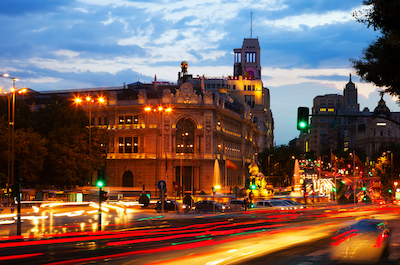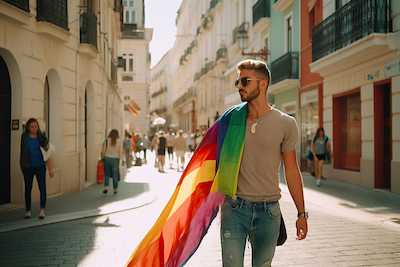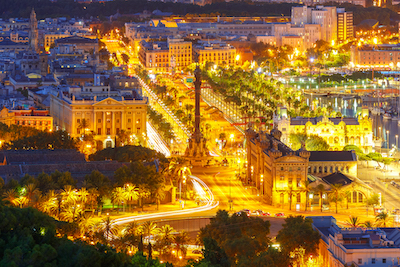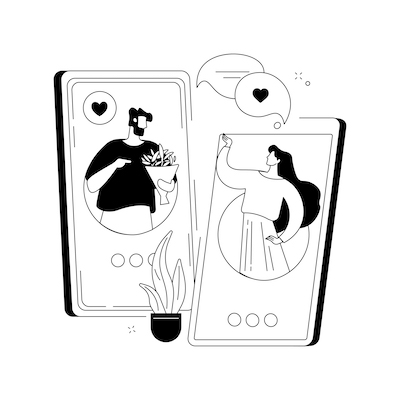As a culturally warm and picturesque European destination, Spain is often romanticized as the land of the three S’s: sexo, sol y sangria. That’s sex, sun (sunshine), and the sangria drink. But in reality, Spaniards are known for their openness, expressiveness, and love for socializing, all of which play a significant role in the way they approach dating and relationships. The country’s dating culture, influenced by its traditions and values, is an essential aspect of the Spanish lifestyle. In this overview of the dating culture in Spain, exploring its key characteristics, the role of family and social circles, the influence of technology, and the impact of cultural norms on the dating scene.
Before getting into the details of dating in Spain, let’s first summarize what it means to be ‘Spanish’. Many people might be surprised to know that Spain is a country of countries, so-to-speak. Spain has several predominate regions, each having their own cultural and traditional practices, even there own language. For example, the Basque country is culturally different than the rest of Spain. They speak a unique language and have traditions not shared by other regions. Other notable regions, like Catalunya, have their own language and follow unique customs. Though these regions are different, for the purposes of understanding dating customs in Spain, we’ll generalize a bit and make specific notes where regional differences where it is relevant.
Spanish dating culture is characterized by its relaxed and passionate nature, with an emphasis on enjoying the company of others and forming deep connections. Spaniards often prefer spending time getting to know their romantic interests through group social activities before engaging in one-on-one dates. This allows individuals to form a friendship and establish trust before entering into a romantic relationship.
Traditionally, Spanish dating culture follows a more conservative approach, with men taking the initiative to court women and express their interest. However, as the country becomes more modern and progressive, there is a growing acceptance of women initiating romantic pursuits and equal participation in the dating process.
In Spain, the family plays a significant role in the dating culture, as they are often involved in approving potential partners and offering guidance in romantic matters. Spaniards tend to have close-knit families and maintain strong bonds with their relatives. As a result, the approval of one’s family is crucial in establishing and maintaining romantic relationships.

Similarly, social circles are an integral part of the dating process in Spain, as they provide a safe and supportive environment for individuals to meet and connect with potential partners. Spanish people place great importance on friendship, and group gatherings are a common way for people to form new relationships and strengthen existing ones.
As Spain continues to modernize, the dating culture faces challenges arising from the clash between traditional values and progressive ideals. While many Spaniards are embracing gender equality and the acceptance of diverse relationship structures, there remains a segment of the population that adheres to traditional gender roles and expectations. This can lead to differing expectations and potential misunderstandings between partners.
Moreover, Spain’s economic challenges, particularly high youth unemployment, have impacted the dating culture as financial stability is often considered a crucial factor in long-term relationships. This can lead to a delay in commitment or settling down for many young Spaniards.
Lastly, technology, particularly the rise of online dating platforms, has had a noticeable impact on the dating culture in Spain. Apps like Tinder, Badoo, and Meetic have gained popularity among the younger generation, who are more open to utilizing technology to expand their social circles and meet potential partners. However, despite the growing acceptance of online dating, face-to-face interactions and group social events remain a vital aspect of the Spanish dating scene.
While these general observations can provide insight into the dating culture in Spain, it’s important to remember that individual preferences, regional differences, and cultural backgrounds can all influence dating experiences. As we mentioned, we’ll do our best to highlight regional differences throughout this article.
10 Interesting facts about dating in Spain
- La Ruta del Amor: In the region of Andalusia, there is a hiking trail called “La Ruta del Amor” (The Route of Love), which is believed to bring good fortune to couples who walk the path together.
- Las Fallas de Valencia: This annual festival held in Valencia involves the creation of massive sculptures, called “fallas,” which are burned on the last night of the event. One popular tradition is for couples to write their names on a piece of paper, attach it to a firecracker, and light it together, symbolizing their love burning brightly.
- Noche de San Juan: During the Night of St. John, a summer solstice celebration, it is customary for couples to jump over bonfires together, as a symbol of purifying their love and ensuring a prosperous future.
- “Pedida de mano“: In traditional Spanish engagements, the groom-to-be would ask his future father-in-law for his daughter’s hand in marriage during a formal event called “pedida de mano.” This custom is still practiced in some regions, although it has become less common in recent years.
- Wedding traditions: Spanish weddings often involve unique customs, such as the groom presenting his bride with 13 gold coins, symbolizing his commitment to provide for her. Additionally, instead of wedding bands, some Spanish couples exchange “arras,” small gold coins that represent their shared wealth and commitment to each other.
- Flamenco-inspired love: Flamenco, a passionate and expressive dance form originating in Spain, has inspired many love stories and romantic encounters. The emotional intensity of the dance has made it a popular theme for passionate romance and connection.
- PDA and kissing in public squares: PDA is common in Spain. In some Spanish cities, like Barcelona and Madrid, public squares are known as popular spots for couples to share a passionate kiss. These public displays of affection are widely accepted and embraced in Spanish culture.
- Spanish nicknames for loved ones: Spaniards often use affectionate nicknames when referring to their partners, such as “mi vida” (my life), “cielo” (sky or heaven), and “corazón” (heart), highlighting the importance of love and connection in their lives.
- Spanish proverbs about love: Spanish culture is rich with proverbs that reflect the complexities of love and relationships. For example, “El amor todo lo puede” (Love can do everything) and “Quien bien te quiere, te hará llorar” (Who loves you well will make you cry), illustrating the passion and emotional depth of Spanish love.
- Late night dating: Spain is famous for its late-night social scene, with many restaurants, bars, and clubs staying open well into the early morning hours. It’s not uncommon for dates to begin late in the evening and continue until the early morning. This relaxed approach to scheduling allows for more spontaneous and leisurely dating experiences.
Most Romantic Holiday in Spain
Unsurprisingly, there is not just one romantic holiday in Spain. There are several days throughout the year that are considered romantic, each with its unique customs and traditions. Some of these days are regional, while others are more nationally celebrated.

- Valentine’s Day (Día de San Valentín): Like in the United States, Valentine’s Day is celebrated on February 14th by some people in Spain. Celebrating couples exchange gifts, flowers, and chocolates, and it is common to enjoy romantic dinners or plan special outings.
- Día de San Jordi (St. George’s Day): Celebrated on April 23rd in Catalonia, St. George’s Day is a highly romantic occasion. According to the legend, St. George saved a princess from a dragon, and a rosebush grew from the blood of the slain beast. On this day, it is customary for men to give their partners a red rose, while women gift a book to their loved ones. The streets of Barcelona and other Catalan cities are filled with book and rose stalls, creating a romantic atmosphere.
- Día de los Enamorados (Lover’s Day): In the region of Valencia, Lover’s Day is celebrated on October 9th, coinciding with the Valencian Community Day. This day honors the legend of a Valencian knight and a Moorish woman who fell in love and fought for their relationship. The day is marked by various events, including reenactments of the love story, parades, and the exchange of gifts between couples.
- Noche de San Juan (Night of St. John): This celebration takes place on June 23rd, during the summer solstice. With bonfires lit on beaches and in public squares, couples and friends gather to celebrate the longest day of the year. It is customary for couples to jump over the bonfires together as a symbol of purifying their love and ensuring a prosperous future.
These romantic days in Spain showcase the country’s rich cultural diversity, history and emphasize the importance of love and connection in the lives of Spaniards. Each celebration offers unique traditions and customs, allowing couples to express their love and commitment in various ways throughout the year.
Typical First Date in Spain
There is not one thing that constitutes a typical first date in Spain. It’ll often depend on the city or town, season and overall desires of the individuals. However, a common first date in Spain might involve a relaxed and social atmosphere, reflecting the country’s warm and outgoing nature. Here are some examples of what one might expect on a first date in Spain:
- Meeting for drinks or tapas: Going out for drinks or tapas (small plates of food) is a popular first date option in Spain. Sharing tapas allows couples to try various dishes and engage in casual conversation, creating a low-pressure environment to get to know each other better.
- Evening start time: In Spain, it is common for dates to start later in the evening, often around 9 or 10 PM, due to the country’s late-night social culture.
- Public spaces: A first date in Spain may also take place in a public space, such as a park or a city square, where couples can enjoy a leisurely stroll, an ice cream, or a coffee while chatting and getting to know each other.
Dating etiquette in Spain
Casual dating is quite common in Spain. It is important to keep dating etiquette in mind. Here are our top tips for Spain:
- Dress to impress: Spaniards generally take pride in their appearance, so dressing well for a first date is important. Choose an outfit that is stylish and appropriate for the chosen date activity.
- Punctuality: While Spain is known for its laid-back approach to time, it is still a good idea to be punctual for a first date. However, it’s helpful to be aware that your date may arrive a few minutes late, as this is not considered rude in Spanish culture.
- Chivalry and politeness: Traditional chivalry is still valued in Spain, so it’s common for men to hold doors, offer their jackets, or pay for the date. However, it’s essential to be aware of your date’s preferences and adapt to more egalitarian views if necessary.
- Engaging conversation: Spaniards are known for their expressive communication style, so engaging in lively conversation and showing genuine interest in your date’s life will help create a strong connection.
- Physical touch: Light physical touch and close proximity are common in Spanish communication, but it’s important to gauge your date’s comfort level and respect their boundaries.
- Follow-up: After a successful first date, it’s a good idea to send a message or call to express your interest in seeing the person again. This direct approach is generally appreciated in Spain.
By being aware of the typical first date scenario in Spain and following these dating etiquette tips, you can navigate the Spanish dating scene with confidence and enjoy a memorable and enjoyable experience.
How important is it to speak Spanish in Spain?
Though compact, Europe is a linguistically diverse continent. This is diversity is evident in the dating scene as well, where many lovers find themselves in multicultural situations. In Spain and other parts of Europe, language knowledge is frequently an integral part of getting to know someone new.
Contrary to popular belief Spain is not a monolingual country. Does everyone in Spain speak Spanish, mostly yes, but there are several other languages which carry extreme significance by region. In addition to Spanish, Basque (Euskara), Catalan, Asturianu, Gallego and others are spoken all spoken in Spain to varying degrees. Further, because there has been significant immigration in recent years, it is in not uncommon to find Arabic, English, German, Spanish, Italian, Turkish, Romani or other language speakers as well.
As the distance between countries and cultures inside of Europe is small, most Spaniards are multilingual in some capacity. As Spain borders Andorra, France and Portugal students will often study and/or have familiarity with English, French, German, Catalan, Spanish or Italian for practical reasons. This is especially true in bordering towns and cities since the need to use the language in everyday life is tangible.
If you are a foreigner or tourist, we do always recommend learning language and studying local culture. Language is incredibly important form of human connection and knowing some of the local language will greatly enhance your experience. It may not be possible to learn all languages, especially if backpacking through, but relying on your English is limiting and alienating. If you can learn to speak basic or intermediate level Spanish, a few phrases will go a long way. Nothing shows your date more respect than genuinely learning about his or her culture.
While some Spaniards will also speak English or other languages, being able to communicate in any other local language can help to build stronger relationships with, facilitate communication in a variety of contexts and gain respect or trust with Spanish people. It is a win-win situation for you and the culture of Spain.
Is Spain gay friendly?
Spain is widely considered one of the most gay-friendly countries in the world, with progressive laws and a generally accepting attitude towards the LGBTQ+ community. In 2005, Spain became the third country in the world to legalize same-sex marriage, and it also allows same-sex couples to adopt children.

Major cities like Madrid, Barcelona, and Sitges are particularly known for their vibrant LGBTQ+ scenes, with numerous bars, clubs, and events catering to the community. Madrid Pride, held annually in July, is one of the largest LGBTQ+ pride events in the world, attracting millions of visitors from across the globe.
While acceptance and tolerance are generally high, it’s essential to remember that attitudes can vary depending on the region, city, or even neighborhood. In rural areas or smaller towns, the LGBTQ+ community may be less visible, and conservative attitudes may still exist. However, overall, Spain is a welcoming and inclusive destination for LGBTQ+ travelers and residents.
Social Cues and Gender roles
In Spain, dating and social cues are influenced by the country’s warm and passionate culture. While traditional gender roles have been part of Spain’s dating culture historically, these roles have evolved over time, particularly in urban areas and among younger generations. Here are some key points to consider regarding social cues and gender roles in Spain:
- Chivalry and courtesy: Traditional chivalry is often appreciated in Spain, particularly among older generations. This can involve men holding doors, offering their jackets, or paying for the date. However, it’s essential to be sensitive to your date’s preferences and adapt to more egalitarian views if necessary.
- Expressive communication: Spaniards are known for their warm and expressive communication style, which often involves physical touch, eye contact, and animated gestures. This level of physical interaction helps create a more intimate and engaging atmosphere during dates and allows both partners to express their feelings more openly.
- Physical touch: Light physical touch, such as touching an arm or a shoulder during conversation, is common in Spanish culture. While this level of closeness is generally appreciated, it’s essential to gauge your date’s comfort level and respect their boundaries.
- Compliments and flirting: Compliments and flirting are a natural part of dating in Spain, with both men and women engaging in this form of playful communication. However, it’s crucial to be respectful and genuine in your approach to avoid making your date feel uncomfortable.
- Taking the lead: Historically, men in Spain were expected to take the lead in pursuing romantic relationships, initiating dates, and making the first move. However, this traditional gender role has evolved, and many women in Spain now feel comfortable initiating romantic connections or expressing their interest openly.
- Integrating with friends and family: Spaniards value close relationships with friends and family, so integrating into each other’s social circles is an important aspect of dating in Spain. It’s common for couples to spend time with each other’s families and friends, attend gatherings, or participate in group activities.
Best places to meet singles in Spain
In Spain, there are numerous places to meet singles, both in major cities and smaller towns. Some of the best places to meet singles in Spain include:

- Bars and clubs: Spain has a thriving nightlife scene, with many bars, pubs, and clubs where you can meet new people. In larger cities like Madrid, Barcelona, and Valencia, you’ll find a wide variety of establishments catering to different tastes and interests.
- Social events and parties: Spaniards are known for their love of social gatherings, and attending parties or events is an excellent way to meet new people. Whether it’s a house party, a local event, or a larger festival, these occasions can provide opportunities to make connections with other singles.
- Cultural events and festivals: Spain is home to numerous cultural events and festivals throughout the year, such as La Tomatina, Las Fallas, and Feria de Abril. Attending these events can provide a unique opportunity to meet other singles who share your interests and appreciate Spanish culture.
- Meetup groups and language exchanges: In major cities, there are numerous meetup groups and language exchanges where people gather to practice speaking different languages or share common interests. These events can be an excellent way to make new friends and potentially meet romantic partners.
- Dance classes: Spain is known for its rich dance culture, including flamenco, salsa, and bachata. Joining dance classes is a fun way to meet other singles while learning a new skill and immersing yourself in Spanish culture.
- Parks and public spaces: Spanish cities often feature beautiful parks and public spaces where locals gather to socialize, relax, or engage in outdoor activities. Visiting these spaces can provide a casual and low-pressure environment for meeting new people.
- Online dating: As we’ll discuss later in this article, online dating has become increasingly popular in Spain. Apps and websites are commonly used to connect with local singles and expand your social circle.
By exploring these different avenues, you can increase your chances of meeting singles in Spain and potentially forming new romantic connections. Remember that Spaniards are generally warm and welcoming, so don’t be afraid to strike up a conversation or join in on social activities.
Staying Safe while Dating in Spain
Staying safe while dating in Spain involves taking some general precautions. Here are some tips to help you stay safe:
- Meet in public places: When going on a date with someone you’ve met online or do not know well, always choose a public location, such as a café, bar, or restaurant. This ensures that there are other people around, making it a safer environment.
- Inform a friend or family member: Let someone close to you know about your date plans, including the location and the person’s contact information. It’s also a good idea to establish a check-in time with them to confirm that everything is going well.
- Be cautious with personal information: Avoid sharing too much personal information, such as your home address, workplace, or financial details, with someone you’ve just met. Take the time to build trust before disclosing sensitive information.
- Trust your instincts: If something feels off or uncomfortable during a date, don’t hesitate to leave or put an end to the situation. Trust your gut and prioritize your safety.
- Be aware of potential scams: While dating scams are not unique to Spain, it’s essential to be cautious of potential red flags. Scammers may create fake profiles on dating apps or websites, and their main goal is usually to extract money from their victims. Be wary of individuals who ask for financial assistance, share a sob story, or request personal information too soon.
- Limit alcohol consumption: While enjoying a drink during a date is common in Spain, be mindful of your alcohol consumption. Drinking responsibly can help you maintain your judgment and stay alert to any potential dangers.
- Use reputable dating platforms: Choose well-known and reputable dating apps or websites to increase the likelihood of meeting genuine people. These platforms often have safety measures in place, such as user verification, to protect their users.
- Practice safe sex: If you decide to become intimate with your date, make sure to practice safe sex by using protection and discussing boundaries and consent beforehand.
By following these safety tips, you can minimize potential risks while dating in Spain and focus on having an enjoyable and positive experience.
Dating scams in Spain
In Spain, as in many other countries, dating scams are a concern for individuals seeking love and companionship. Scammers often prey on the emotions and vulnerabilities of individuals, using various tactics to deceive and exploit their victims. Here are some common dating scams in Spain:
- Catfishing: Catfishing involves creating fake profiles on dating platforms or social media sites to lure victims into false relationships. Scammers use stolen photos and fabricated personal details to appear genuine and establish trust with their targets. Once an emotional connection is established, the scammer may request financial assistance or gifts, citing various reasons such as medical emergencies, family issues, or travel expenses.
- Romance scams: Romance scams are a more advanced form of catfishing, where scammers manipulate victims into believing they are in a genuine romantic relationship. After gaining the trust of their victims, the scammer will fabricate a crisis or urgent need for money, asking their targets to send funds. In some cases, the scammer may even promise to visit the victim, only to concoct more emergencies to request additional funds.
- Online extortion scams: In this type of scam, the fraudster coerces the victim into sharing explicit photos or videos, and then threatens to expose the content to the victim’s family, friends, or employer if they do not pay a ransom. This blackmail tactic preys on the victim’s fear of public humiliation and can result in significant financial and emotional damage.
- Phishing scams: Phishing scams involve the use of fraudulent emails, messages, or websites to obtain personal information, such as login credentials, credit card numbers, or bank account details. Scammers may pose as a dating platform or another trusted entity to trick victims into revealing their sensitive information, which can then be used for identity theft or other criminal activities.
- Travel scams: Travel scams are a common occurrence in Spain, particularly in popular tourist destinations. Scammers may pose as attractive locals on dating apps or websites, enticing victims to visit Spain or engage in a romantic getaway. Once the victim arrives, the scammer may disappear, leaving the victim stranded and financially burdened by the costs of travel and accommodations.
To protect oneself from dating scams in Spain or any other country, it is essential to be cautious when sharing personal information, avoid sending money to individuals you have not met in person, and verify the identity of potential partners through video calls or by seeking the input of friends or family members. Additionally, it is crucial to report any suspicious behavior to the dating platform or the relevant authorities to help prevent others from falling victim to similar scams.
Online dating in Spain

Online dating in Spain has become increasingly popular in recent years, with many people using dating apps and websites to meet potential partners. The industry is experiencing significant growth, with an estimated annual revenue of €38 million in 2020. Spanish dating apps and websites offer users a range of features, such as swiping, chatting, and video calling, to connect with local singles and expand their social networks.
Challenges to online dating in Spain
Though Spanish are increasingly more open to online dating, the industry in Spain is not without its challenges. Here are a few considerations which may help to explain why online dating in Spain might not be popular with all single daters.
First, dating apps are often viewed as superficial and lacking substance. Spanish tend to be cultured and give great importance to social interactions. Since many dating apps like Tinder, are focused on a hot or not concept, they are not overly appealing to many Spaniards. Instead of judging someone purely on their outward physical appearance, Spaniards are looking for deeper value and connection from a potential partner. Though Tinder may not offer this, other apps like Hinge do. Therefore, certain dating apps may be more popular than others in Spain.
Second, there are security concerns with online dating and American tech companies in general. In addition to the number of popular online dating scams in circulation, data privacy is major concern for the Spanish. After all, Europe led the charge with their insistence of the General Data Protection Regulation (GDPR) law which forced all tech companies to comply. Though we think this is a great thing for consumers, it presents a challenge for tech companies who have a history of collecting large amounts of personal data on their users. This is especially in online dating where lots of personal information might be exchanged.
Third, another obstacle for online dating in Spain is the fact that it is already quite easy for Spanish to meet other singles. Spaniards spend a lot of time walking around or in commute. In addition, Spain has a relatively vibrant night life and social scene. Spanish singles can easily meet in a cafe or any other public setting. Therefore there is lack of need when compared to North American countries like the United States or Canada.
Another important and subtle challenge for online dating in Spain is the simple fact that it has an aging population. While regions like Africa, Latin America and parts of Asia have young and growing populations, the population in Europe is actually in decline. As of 2020, the median age in Europe was 42.5, while 42 in Spain.6
While this list of challenges for online the dating industry in Spain is not inclusive, these four points highlight some of the obstacles dating apps might face there.
Top dating apps in Spain
Here are some of the top dating apps and websites used in Spain:
- Tinder: Tinder is a popular dating app that uses a swiping mechanism to connect users based on their preferences and location. The app is free to use, with a paid version that offers additional features like unlimited swipes and the ability to see who has liked your profile.
- Badoo: Badoo is a dating app and social networking platform that allows users to connect with people based on their location and interests. It offers a range of features, including video chat, the ability to send gifts, and a “People Nearby” function that shows nearby users.
- Meetic.es: Meetic.es is a popular dating website that caters to singles in Spain and other European countries. It offers a range of features, including a personality test, compatibility matching, and a chat function.
- Happn: Happn is a dating app that uses geolocation technology to show users profiles of people they have crossed paths with in real life. It allows users to connect with people they may have missed the chance to meet otherwise.
- Lovoo: Lovoo is a dating app that focuses on connecting people based on shared interests. It offers a range of features, including live video chat, the ability to send icebreakers, and a radar function that shows nearby users.
- AdoptaUnTio: AdoptaUnTio is a unique dating app that allows women to “adopt” men and initiate conversations with them. Men create profiles that are displayed as “products” on the app, and women can browse and choose who they want to chat with.
- EliteSingles: EliteSingles is a dating website that caters to singles looking for serious relationships. It offers a personality test and compatibility matching to help users find compatible partners.
- eDarling: eDarling is a dating website that uses a personality test and compatibility matching to connect users with potential partners. It offers a range of features, including a mobile app, messaging, and a “Who’s Viewed Me” function.



